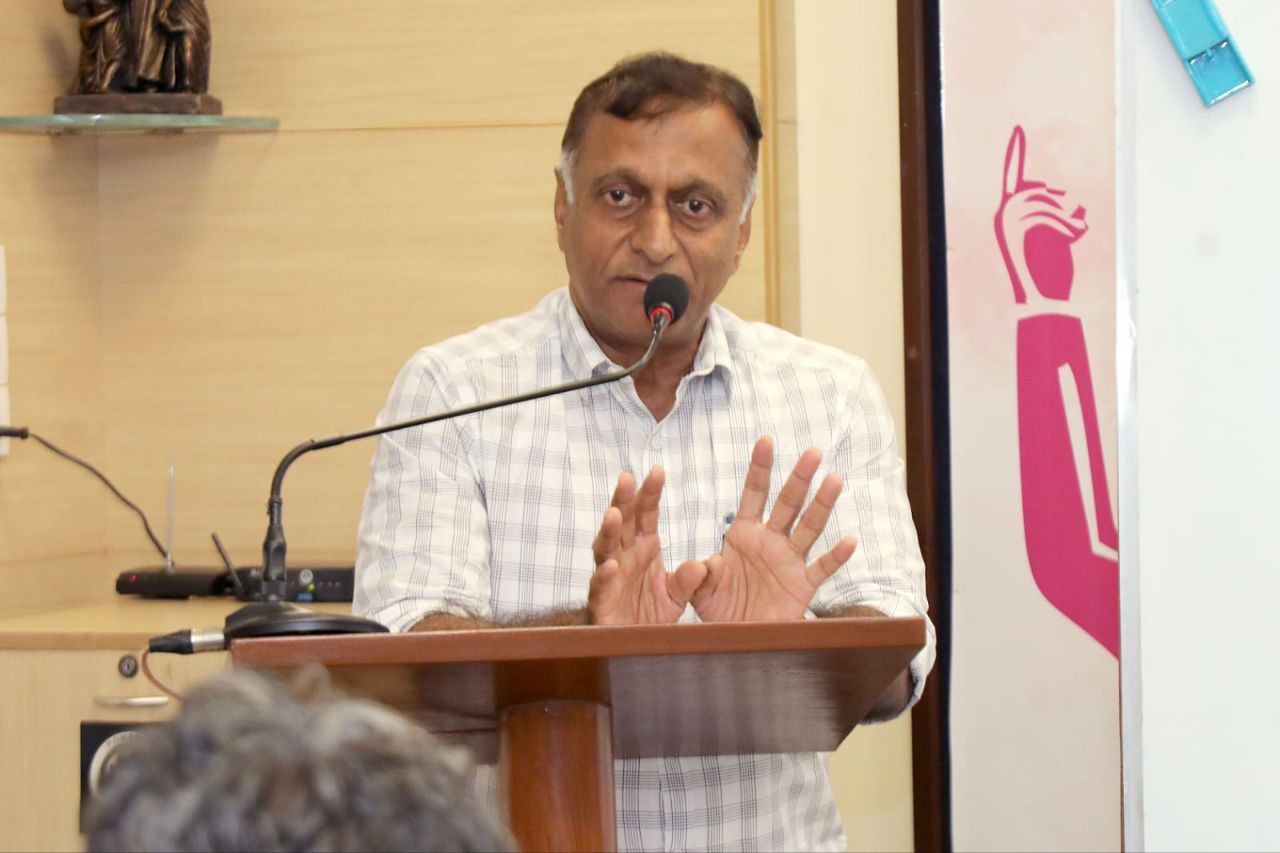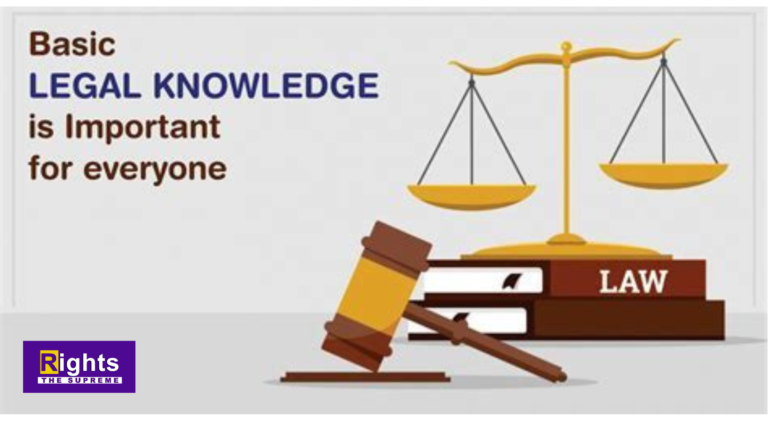It has been generally believed among different sections and groups of the society that legal education is only for the law students, lawyers etc. But have you ever thought that how important role can basic legal education play in our daily life. It is very necessary for every person to have certain knowledge of Law, otherwise it would become very difficult for him to tackle several problems, from consumer protection to fundamental rights. When a person hears the word " Legal Education", a picture which is framed in his mind of lawyer or a law student or court or similar to all these. We keep ourselves away from all these things, by convincing ourself saying that all these stuffs are not our cup of tea. But, have you ever thought that this ideology sometimes become the problem when someone takes away your right, and you would not be in a position to stop him from doing so. It is not because you do not know such person is taking away your rights, but because you do not know how to enforce and stop that person. Does it become necessary in these kinds of situations to have certain legal knowledge, so that you might be able to stop that person from violating your right. Moreover, even if you are aware of you Rights, have you ever thought of a person who is not aware of all this. Would it take much time to stop a person from not violating rights of another person? Would it take much time to tell a person where to go and how to enforce his rights?
Why Basic Legal Education is Necessary?
There are certain laws and regulation, basic knowledge of which is very necessary for a person, even if doesn't belong to a group which is related to legal field. If you don't belong to legal field, then have you ever thought " What would you do if someone stops you from going somewhere? ", " What would you do if someone stops you from entering a public place? ", " What would you do if someone denies you an opportunity without any valid reason? ". If I am not wrong, Your answer would be " Yes, I have a right to do that thing, and the person who is stopping me from doing such an act is infringing my right".
But, the question is " Which Rights? ", " How to enforce it?", " Am I interested in enforcing those right? "or "Even after knowing those rights I couldn't enforce it, because I do not know how to enforce it". Indeed, it is true that even after having the knowledge of infringement of Rights, usually a person would ignore it as he doesn't know the means to enforce it. And it encourages such persons, who are infringing the rights of several persons without any reason. Moreover, this is the reason why certain basic knowledge of legal education is necessary. Our Constitution has provided certain Fundamental Rights for every citizen and certain Fundamental Rights for every person (May not be a citizen), but if you are not related to legal field, then are you aware of these fundamental rights? It would not be wrong to say that there are several people, who are not aware of their Fundamental Rights, and due to which they do not even become aware when their Fundamental Rights get violated without any cause.
Take an example of a person who is caught by a police constable in the street without any reason, and has been dragged by him to the Police Station. Generally, a normal person would only plead not to arrest him, because he has not done something which is wrong. This is due to the lack of certain legal knowledge, he is not aware of the fact that " No Police Constable/ officer can arrest him without a warrant (except some serious issues) ". Lack of knowledge is the main reason that certain rights of a person get violated so easily. It has been said that " Knowledge is the Power", and indeed it is not wrong. An educated person would be well aware of his rights which no one can take away from him, but what about those persons who do not have any such knowledge and are exploited easily?
How to know whether Your Right has been Violated?
The main reason why a normal person do not take the violation of his rights seriously, because he lives under a belief that he would have to pay certain amount to the concerned lawyer. Moreover, he is scared of the legal process and the judicial system of the Country. And, indeed he is not wrong. But there is another way which can be used by you to know how your rights can be protected from getting violated.
There are around 952 Law Universities/ Colleges in India, which have been recognized Bar Council of India. There is a provision in these colleges to have a department of "Legal Aid Society/ Legal Aid Clinic". This is the place where you can go to. If you are in a state of doubt as to whether your Right has been violated or not, run to this place in the law college near you, and they would provide you the information which you are seeking. There are various law colleges who are not actively participating in these activities, and if you go around and ask them the reason why your rights have been taken away by someone, they would also become active.
Moreover, a poor person who is not able to bear the expenses of the court proceeding and the lawyers can run around to the Legal Aid Officer who is available in every District at the District Court. They why to wait, is it not your responsibility to make a common man aware of his rights and how these rights can be saved. It would be better if you could spread this word, not is a casual way but in a forceful way.
Here's why legal literacy is crucial for everyone:
1. Protecting Rights: Knowledge of basic legal principles enables individuals to recognize and defend their rights. Understanding concepts such as freedom of speech, privacy rights, and property ownership empowers individuals to assert themselves in various situations, whether dealing with authorities, employers, or businesses.
2. Navigating Legal Systems: From signing contracts to resolving disputes, legal processes are an inevitable part of life. A basic understanding of legal terminology and procedures equips individuals to navigate these systems more effectively. It allows them to comprehend legal documents, such as leases, employment agreements, or insurance policies, and make informed decisions.
3. Preventing Legal Issues: Proactive knowledge of laws and regulations can help individuals avoid legal pitfalls. Whether it's understanding traffic laws to prevent accidents or knowing consumer rights to avoid scams, legal literacy fosters a sense of responsibility and foresight in everyday activities.
4. Promoting Civic Engagement: Informed citizens play a crucial role in shaping society. Legal knowledge enables individuals to engage meaningfully in civic activities such as voting, advocacy, and community organizing. It equips them to participate in discussions on policy matters and contribute to the democratic process.
5. Advocating for Justice: Legal literacy empowers individuals to advocate for themselves and others. Understanding the legal avenues available for seeking redress, such as filing complaints or accessing legal aid, enables individuals to address injustices and contribute to a more equitable society.
6. Fostering Compliance: Ignorance of the law is not an excuse, as the adage goes. Legal knowledge encourages compliance with laws and regulations by fostering an understanding of societal norms and expectations. It promotes responsible behaviour and ethical decision-making, both in personal and professional contexts.
7. Adapting to Change: Laws evolve to reflect societal values and address emerging challenges. Keeping abreast of legal developments ensures that individuals can adapt to these changes and anticipate their implications. Whether it's understanding new regulations in the workplace or changes in family law, legal literacy facilitates resilience and adaptability.
8. Access to Justice: Legal knowledge is a tool for promoting access to justice, particularly for marginalized communities. By understanding their rights and available legal resources, individuals can overcome barriers to justice and advocate for fair treatment under the law.
Interview on #khulke App:
https://www.khulke.com/roundtable?id=65d7175a440de4c7b457976d

Here on #khulke App, we have Real life hero Mr. Kamlakar Shenoy, who faced so much because of corrupt and inefficient legal machinery. After lots of struggle, he decided to spread awareness of legal and democratic rights among needy common man.
Conclusion:
In conclusion, legal knowledge is not just the domain of lawyers and policymakers; it is a fundamental aspect of citizenship and everyday life. Empowering individuals with legal literacy enhances their ability to protect their rights, navigate complex systems, and contribute positively to society. Therefore, investing in legal education and promoting awareness of legal rights and responsibilities is essential for building informed and empowered communities.

